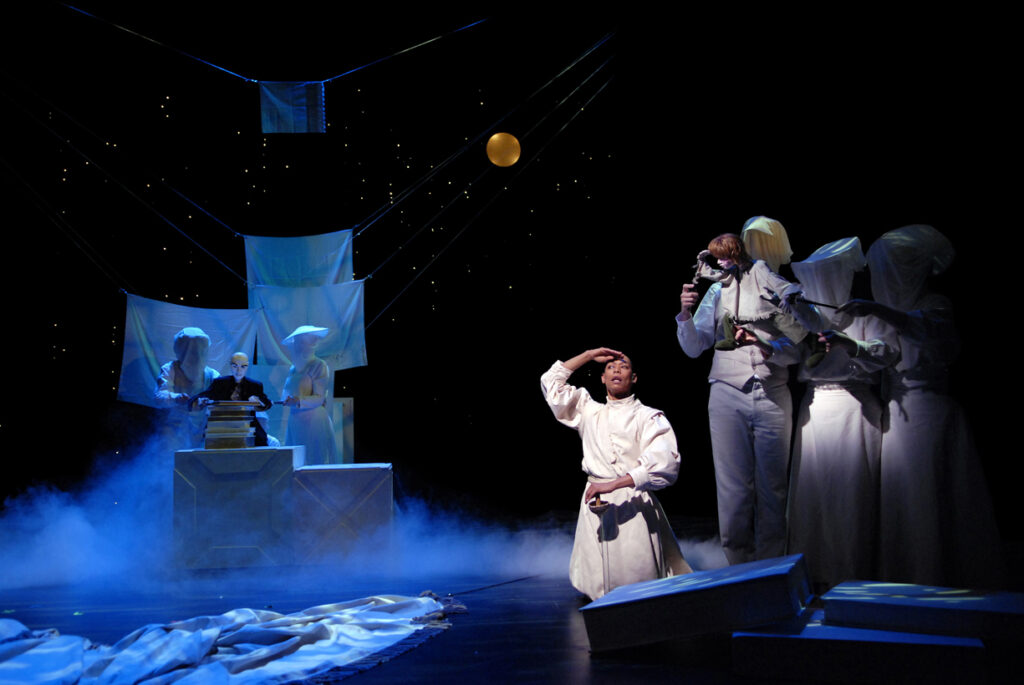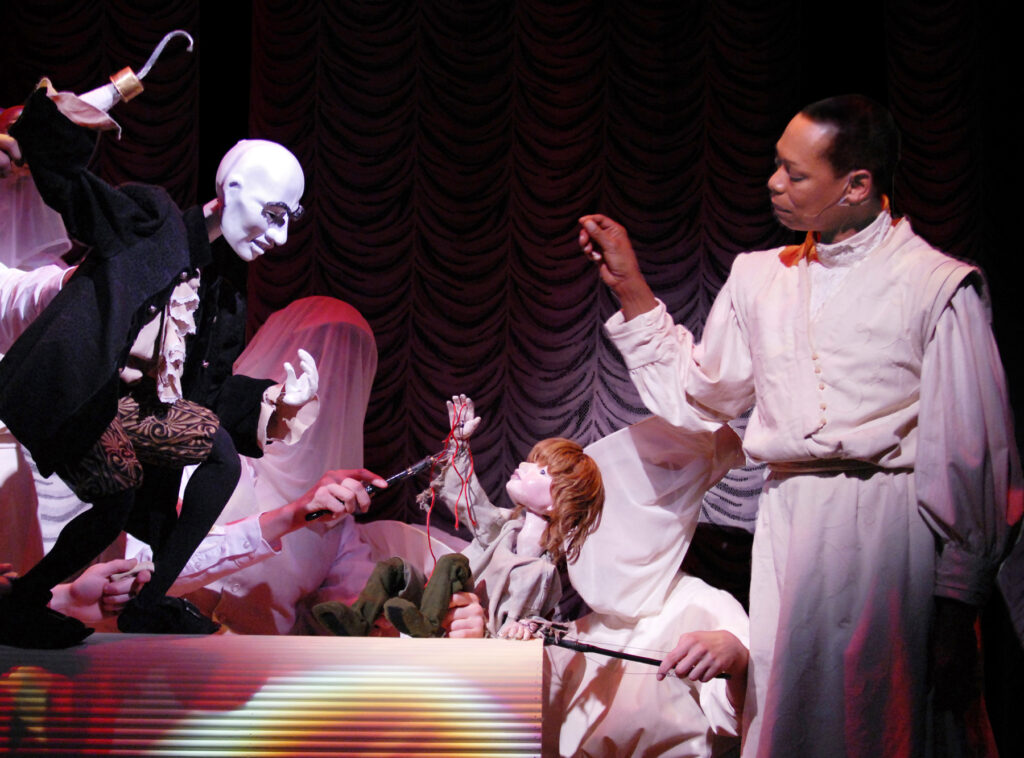
Scene from Mabou Mines Peter and Wendy with Karen Kandel. Photograph taken by Richard Termine.
I remember reading Peter Pan as a kid, a version based on the 1953 Disney movie—based on J. M. Barrie’s story. It turned me on. I’m six or seven, and I’m flipping through the pages, and there’s a picture of Peter with his arms crossed and his back to Wendy. He’s angry with her for some reason, and it turned me on. The words, the image, the anger? All of it, some kind of thrill-ball a kid has no words for.
All kinds of people become aroused, in one way or another—when we’re children and when we’re old. It doesn’t start or stop. Aliveness is erotic, the senses awakened. Everyone knows kids get turned on by this thing or that thing without instruction by adults. If you want to know why people lie about this fact and pretend that children—and often female humans along with them—start out sexually “innocent,” I can refer you to Nietzsche, who blames Christianity. Sexual feeling is anarchic, sudden, and sometimes inconvenient. It can’t really be contained.
What to call the feelings you don’t have words for? A kind of fainty, oh my God what is this sensation I wouldn’t have spoken about. It wasn’t because I was masturbating. I didn’t learn to masturbate, so I could come, until after I’d had sex. I’m twenty, maybe, when one day I say to myself, “If he can do that, so, probably can you.”
As a child, I wouldn’t have spoken about my “funny feelings” perhaps because shame moves in early. Also, in childhood, secrecy is all we have—our private inner lives—in a world where adults control so much of us. Maybe, as children, we keep arousal to ourselves because we don’t want anyone tampering with our pleasure. Also, in childhood, there’s no end of feelings we don’t have language to describe—grief, fear, and anxiety about things we anticipate, come to mind. Secrets are sexy.
With Peter Pan, the feeling came from reading and looking at pictures on the page. Oh my God, words could do that! Later, when I discovered porn, I was even more impressed by the excitement reading could produce. The metaphysical properties of words, bundled into grammar, producing an inner world you could see and smell in your mind and also made your body vibrate.
Is Peter Pan a particularly sexy story? I think it is. Kids as flying runaways, escaping through the window of their house. Freud might not have been right about a lot of things he theorized, but I think he was onto something when he said flying in dreams is sex. Remember all those dreams of flying you had and maybe still have? Until not that long ago, I would dream I was flying down Broadway, close to the ground. It was like swimming, except in air.
Peter Pan is a boy who refuses adult life. As a girl, you identify with his confidence and daring. I mean, who else are you going to identify with? Five minutes after arriving in Neverland, Wendy becomes a mommy figure, tidying up after the lost boys and reading them bedtime stories. In Barrie’s play Peter and Wendy—it debuted in London in 1904 and became a huge and lucrative hit—Peter was played by a woman, a tradition that continued far into the twentieth century. Famously, when I was young, Mary Martin played Peter in a musical version of the play that was broadcast on TV year after year, with Mary and the kids harnessed to ropes that lifted them into the air.
The eros of the adults who create children’s literature can’t help but wash over their stories, too, and it goes into us, as children, in a way that’s not mediated or judged. Think of Lewis Carroll’s infatuation with his neighbor’s daughter Alice Liddell, the model for Alice in Wonderland. Similarly, Barrie was deeply attached to the five sons of the Llewelyn Davies family, who were near neighbors of Barrie and his wife, and who were the models, he said, for Peter and the lost boys.
In 1997, Mabou Mines, the great avant-garde theater company, presented a version of the Barrie tale that mined its eros of longing, lostness, and escape. I wrote about the production, directed by Lee Breuer and presented at the New Victory Theater in New York, for The Nation, unaware at the time of its connection to the stirrings I’d felt as a kid. Only now do they whoosh together, the girl alone in her bed and this show that lifted off its moorings of innocence and sentimentality to become a meditation on exile so plangent all of us in the audience sobbed.

Scene from the Mabou Mines production of Peter and Wendy, with Karen Kandel. Photograph taken by Richard Termine.
The brilliant actor Karen Kandel played Wendy and Mrs. Darling. She also spoke as ventriloquist for all the other characters, who were represented by puppets and manipulated by a crew of handlers in beekeeper costumes—as Edwardian-style equivalents of Bunraku handlers. Some puppets required several handlers, like Nana the dog, who appeared in act two wearing a crocodile mask as she hunted for Captain Hook. Some puppets were mere toys and two-dimensional shadow puppets on sticks. Some sets were as simple as origami-style models that looked like the miniatures in pop-up books.
There was live music as well, based on Irish shanties, with tough-minded lyrics by Breuer, Liza Lorwin, and Johnny Cunningham. In the songs, the characters struggle for a balance that humans can’t actually achieve. The nursery has mommy but no freedom. Flight is glorious but lonely. Everyone wants a mom, including Hook, but no mom can measure up to the fantasies people form, and even Wendy’s mom, who is devoted to her children, has “a mocking mouth with one kiss Wendy could never get.”
Tinker Bell glories in being abandoned. Peter is sexy but infantile—he’s everyone’s trick and no one’s dependable object of desire. “It is only make-believe that I am their father,” he says, referring to the lost boys. No one can ever really be man enough, the show says, unless they remain a little boy.
At the end of act one, the wolves of Neverland lament their outsideness at the same time they howl for the joy of running free. The mother tries to tidy up her children’s minds and can’t. The map of a child’s mind is Neverland—a sky with stars depicted by pin lights. At the play’s end, the lost boys, having returned to humdrum existences, ache in phantom parts of themselves they no longer have but can still sense, singing for all of us, “Oh magic island, dream of us, set us free.”
Laurie Stone is the author of six books, most recently Streaming Now: Postcards from the Thing that is Happening, which was long-listed for the PEN/Diamonstein-Spielvogel Award for the Art of the Essay. She writes the Streaming Now column for LIBER: A Feminist Review, and she writes the Everything Is Personal Substack.
from The Paris Review https://ift.tt/1LulNYn
Comments
Post a Comment